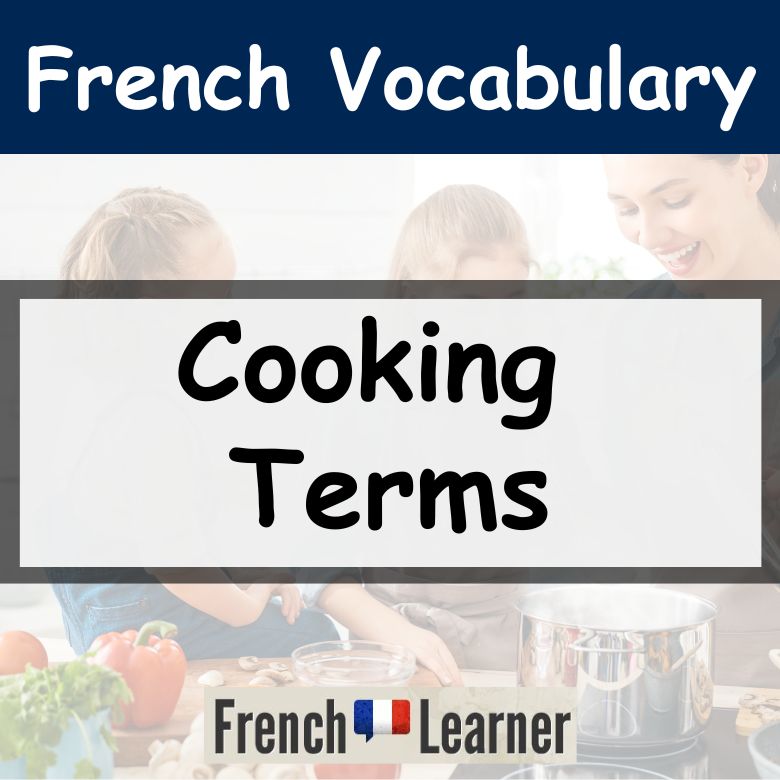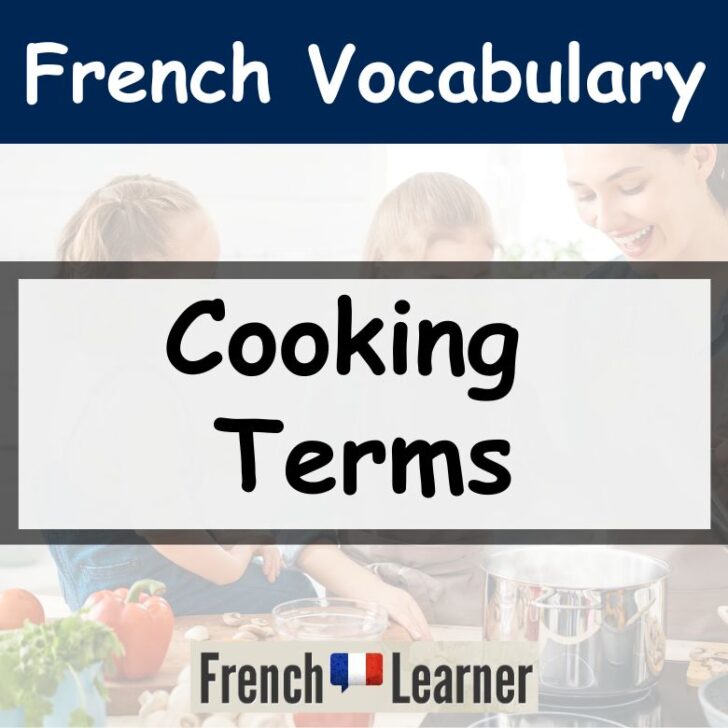Traveling to France to learn to cook or enrolled in a French cooking course? This page offers a comprehensive list of French cooking vocabulary. You’ll find both key verbs and nouns. You’ll see that lots of words don’t have English translations.

French cooking terms
In reading recipes you’ll discover that many of the verbs are preceded by the verb faire, for example faire bouillir. This would translate literally to ‘have the water boiled’. This is a usage of the infinitive mood.
French cooking verbs
- Blanchir to blanch: to beat eggs and sugar; to rapidly mix an ingredient into boiling water
- Ciseler to chop finely
- Clarifier to clarify: to separate the egg white from the yoke; to separate solids from liquids
- Concasser to crush or grind (pepper, etc.)
- Cuire à l’anglaise to cook something in a large amount of salted water
- Déglacer to deglaze; to pour liquid over meat after cooking to mix with the juices and create a sauce.
- Dégorger to disgorge: to dip ingredients in water to remove blood and impurities
- Dépouiller to skin (a rabbit, duck, etc.)
- Détendre to thin, dilute: to add liquid a mix to make it thin or more liquified
- Écumer to skim: to remove mousse from the top of a cooking dish
- Émincer to slice something finely
- Faire bouillir to boil
- Faire réduire to reduce, boil down: to leave a dish on the burner until a desired consistance is reached
- Faire revenir to brown a meat or vegetable; to fry quickly
- Faire suer to sweat: to cook vegetables or meat quickly with butter to bring about their juices
- Flamber to set alcohol on fire; flambé is the related adjective.
- Gratiner to sprinkle the surface of a dish with breadcrumbs and butter or cheese and then broil. The related adjective is ‘au gratin’.
- Lier to thicken, bind: to modify the texture of a sauce by adding a liquid (cream, egg) or flour. The noun le jus lié refers to a thickened gravy.
- Mortifier to tenderize meat
- Mouiller to moisten, add: to add liquid to a dish to allow for cooking
- Napper to coat or cover (e.g. a cake with chocolate).
- Paner to coat with breadcrumbs before frying
- Parer to adorn, dress, trim: to prepare a dish keeping in mind its presentation on the plate; removing that which doesn’t help the presentation.
- Piquer to add fat, bacon or ham to chicken or beef.
- Torréfier to roast: to heat gains (e.g. coffee) or dried fruit in the absence of liquid to render a crunchy texture
French cooking nouns
- la brunoise to act of cutting an ingredient into tiny cubes
- la croûte Croûte: Refers to bread or pastry crust as well as toasted or fried bread.
- la glace de viande Meat glaze: A dark brown gelatinous flavoring agent derived from reduced meat stock.
- la julienne the act of cutting an ingredient into small strips
- la macédoine diced mixed vegetables
- la papillote folded parchment paper or or folded aluminum foiluse for cooking fish, chicken and vegetables.
- la pâte A mixture or paste; uncooked dough.
- la rouille a garlic and oil sauce
- le beurre manié Kneaded butter: Mixture of butter and flour in equal parts used for thickening soups and sauces.
- le beurre noisette Brown butter: Butter melted over low heat and slightly browned; used with savory foods and pastry preparation.
- le bouillon Bouillon: broth or stock used in cooking
- le consommé Consommé: Meat-based bouillon that has been made clear.
- le coulis Coulis: A thick fruit or vegetable purée; for example raspberry coulis.
- le court-bouillon Court-bouillon: stock used most commonly for cooking fish and seafood.
- le dressage presentation
- le mirepoix sautéed mix of vegetables and herbs used as a base for soups and stews.
- le repère flour mixed with egg white to seal pans for slow-cooking dishes.
- le roux flour and fat used together to thicken sauces.
- le velouté a sauce made from roux and stock.
- les croûtons (m) Crouton: Pieces of cubed bread used in soups and salads.
- les duxelles (f) Duxelles: Finely chopped mixture of sautéed mushrooms and herbs into a creamy paste.
- les entremets (m) Desserts or sweets excluding pastries.
- les hors d’oeuvres frist course or appetizer
- un bain-marie Bain-marie: Roasting pan or baking dish containing water for slow cooking
- un bouquet garni Bouquet garni: A mix of aromatic herbs, especially parsely, that’s added to stocks, sauces and soups.
- un moule à manqué a cake pan
- un ragoût a stew
- un sautoir a deep frying pan
- un timbale a type of pan used for baking
- une dariole Dariole mould: A cylinder-shaped mold used for baking.
- une entrée Entrée: Starter or first course of a meal.
- une liaison an agent, often egg yoke or cream, used to thicken a sauce.
- une marmite earthenware container used for soups
- frappé (adj) Iced or set on ice.
- noisette (adj) brown in color (litteral meaning is hazelnut).
- réchauffé (adj) reheated

